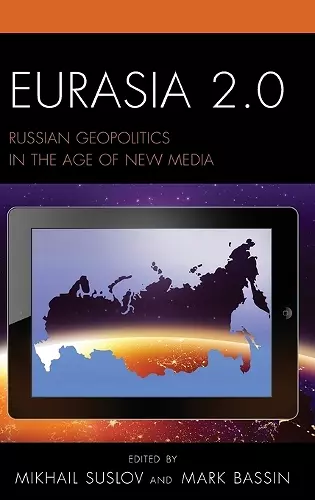Eurasia 2.0
Russian Geopolitics in the Age of New Media
Mikhail Suslov editor Mark Bassin editor
Format:Hardback
Publisher:Lexington Books
Published:17th Mar '16
Currently unavailable, our supplier has not provided us a restock date
This hardback is available in another edition too:
- Paperback£47.00(9781498521437)

This book discusses the return of geopolitical ideas and doctrines to the post-Soviet space with special focus on the new phenomenon of digital geopolitics, which is an overarching term for different political practices including dissemination of geopolitical ideas online, using the internet by political figures and diplomats for legitimation and outreach activity, and viral spread of geopolitical memes. Different chapters explore the new possibilities and threats associated with this digitalization of geopolitical knowledge and practice. Our authors consider new spatial sensibilities and new identities of global as well as local Selves, the emergence of which is facilitated by the internet. They explore recent reconfigurations of the traditional imperial conundrum of center versus periphery. Developing Manuel Castells’ argument that social activism in the digital era is organized around cultural values, the essays discuss new geopolitical ideologies which aim to reinforce Russia’s spiritual sovereignty as a unique civilization, while at the same time seeking to rebrand Russia as a greater soft power by utilizing the Russian-speaking diaspora or employing traditionalist rhetoric. Great Power imagery, enemy-making, and visual mappings of Russia’s future territorial expansion are traditional means for the manipulation of imperial pleasures and geopolitical fears. In the age of new media, however, this is being done with greater subtlety by mobilizing the grassroots, contracting private information channels, and de-politicizing geopolitics. Given the political events of recent years, it is logical that the Ukrainian crisis should provide the thematic backdrop for most of the authors.
The Eurasia 2.0: Russian Geopolitics in the Age of New Media volume masterfully demonstrates that certain recurrent assumptions of geopolitics continue to be very relevant today, particularly when the issues of power and influence touch upon the questions of ideology, national character, and identity. Mikhail Suslov, Mark Bassin and all contributors to this excellent collection of essays go a long way towards uncovering the uneven and multifaceted character of changes in Russia and the politics of identity in Eurasia.... Overall, the book is an important, timely and relevant effort to understand the re-emerging concept of geopolitics in the age of new media. The amount of nuanced research in this volume is noteworthy.... Eurasia 2.0 is a valuable scholarly contribution, which provides a much-needed indication of the processes and challenges in Eurasia, and which will serve as a foundation for future projects. * Europe Now *
As the first English-language study to focus explicitly on digital geopolitics in the context of Russia, Eurasia 2.0 has its finger on the pulse. In providing valuable analyses of emerging political narratives, it fills an important gap in the literature at a crucial historical juncture.... Overall, this is a very strong book... [T]he volume is... an excellent and timely collection that will prove invaluable to both students and more seasoned academics working on contemporary Russia. * Inner Asia *
The reader will walk away with a better understanding of how the ideas of Aleksandr Dugin, Prokhanov, and Dzhemal inform everyday understandings of place in space in the former Soviet Union . . . Eurasia 2.0 will find purchase with scholars from across the field of Russian, Slavic, and Eurasian studies, and is likely to become the text of choice for courses exploring the shifting sands of Russian geopolitics in the age of new media. * Slavic Review *
This collection of scholarly papers on the topic of Russian geopolitics in the context of new digital media is long overdue. . . especially timely because of the ongoing Ukraine crisis. . . . All of the essays are important for understanding Russian geopolitics and identities. . . all are excellent examples of digital geopolitical studies.This pioneering collection reflects the transition of geopolitical studies from classical topics to a more critical focus on communicative environments, with a spectrum of approaches between the traditional and new media, giving the feeling that this volume has an abrupt end and should be continued. * AAG Review of Books *
While there is now an extensive literature examining the reemergence of Eurasianist geopolitical thinking in Russia, this volume is innovative. . . it offers a wide-ranging exploration of shifts in Russian geopolitical sensibility, thought, and practice in relation to the proliferation of online and visual media. . . . overall the writing is effective and ought to be accessible to nonspecialists. A variety of screenshots, maps, charts, photos, and other images usefully convey the visuality of digital geopolitics. * Ab Imperio *
This wide-ranging and challenging collection brings together some of the world’s leading scholars to provide a powerful insight into contemporary Russian and Eurasian developments. The exciting new framework of ‘digital geopolitics’ shows interdisciplinary studies at its best. The vivid and lively contributions range freely across geopolitics, the media, movies, and various forms of identity politics. The digital world is here presented as a new public sphere in which nations and regions look for themselves, and in so doing, provides a unique window into the soul of a people. -- Richard Sakwa, University of Kent
Eurasia 2.0: Russian Geopolitics in the Age of New Media: a most innovative important collection of essays on the geopolitical perspective of post-Soviet Eurasian identity politics and national interest analyzed in the spatial context by digital media. -- Jutta Scherrer, Ecole des hautes études en sciences sociales
ISBN: 9781498521413
Dimensions: 239mm x 161mm x 32mm
Weight: 753g
374 pages